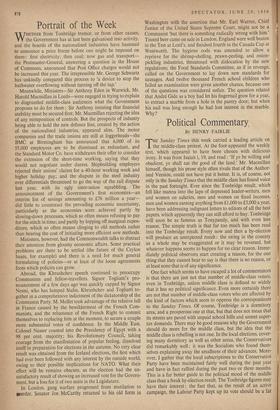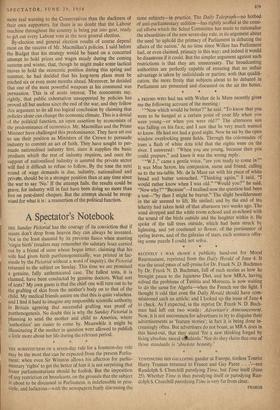'Political Cominentary,
By HENRY FAIRLIE HE Sunday Times -this week carried a leading article on 1 the middle-class protest. At the foot .appeared the weekly text, which appeared to have been chosen with delicious irony. It was from Isaiah i, 19, and read : 'If ye be willing and obedient, ye shall eat the good of the land.' Mr. Macmillan himself, though his prose style often rivals that of the Author- ised Version, could not have put it better. It is, of course, not only in the Sunday Times that the middle class has found voice in the past fortnight. Ever since the Tonbridge result, which fell like manna into the laps of depressed leader-writers, men and women on salaries, men and women on fixed incomes, men and women earning anything from £1,000 to £3,000 a year, have been addressing indignant letters to editors of all the best papers. which apparently they can still afford to buy. Tonbridge will soon be as famous as Tonypandy, and with even less reason. The simple truth is that far too much has been read into the Tonbridge result. Every now and then a by-election will produce an unexpected result : the swing in the country as a whole may be exaggerated or it may be reversed, but whatever happens seems to happen for no clear reason. Imme- diately political observers start creating a reason, for the one thing that they cannot bear to say is that there is no reason, or at least none that is of any significance.
One fact which seems to have escaped a lot of commentators is that there are just not that number of middle-class voters, even in Tonbridge, unless middle class is defined so widely that it has no political significance. ,Even more certainly there are not that number of middle-class voters who are affected by the kind of factors which seem to oppress the correspondents to the Sunday Times. Of course, Tunbridge is a dormitory area, and a prosperous one at that, but that does not mean that its streets are paved with unpaid school bills and unmet super- lax demands. There may be good reasons why the Government should do more for the middle class, but the idea that the middle class is rebelling is not one. In the local elections, cover- ing many dormitory as well as other areas, the Conservatives did remarkably well : it was the Socialists who found them- selves explaining away the smallness of their advances. More- over, I gather that the local subscriptions to the Conservative Party have been maintained fairly well during the past year and have in fact rallied during the past two or three months. This is a far better guide to the political mood of the middle class than a freak by-election result. The Tonbridge figures may have their interest : the fact that, as the result of an active campaign, the Labour Party kept up its vote should be a far more real warning to the Conservatives than the slackness of their own supporters. for there is no doubt that the Labour machine throughout the country is being put into gear, ready to get out every Labour vote at the next general election.
By-election and general election results of course depend most on the success of Mr. Macmillan's policies. I said before the Budget that his strategy would be based on a concerted attempt to hold prices and wages steady during the coming autumn and winter, that, though he might make some tactical moves to hold the economic position during this spring and summer, he had decided that his long-term plans must be pitched six or even more months ahead. Moreover, he decided that one of the most powerful weapons at his command was persuasion. This is of acute interest. The economists say. rightly, that public exhortation unsupported by policies has proved all but useless since the end of the war, and they follow this argument to its all too logical conclusion by claiming that policies alone can change the economic climate. This is a denial of the political function, an open assertion by economists of the predominance of economics. Mr. Macmillan and the Prime Minister have challenged this predominance. They have set out to use their position as Ministers of the Crown to persuade industry to commit an act of faith. They have sought to per- suade nationalised industry first, since it supplies the basic products which the rest of industry requires, and once the support of nationalised industry is assured the private sector will find it difficult to refuse to follow. By the time the next round of wage demands is due, industry, nationalised and private, should be in a stronger position than at any time since the war to say 'No.' If the attempt fails, the results could be grave, for industry will in fact have been doing no more than live on post-dated cheques. But the attempt should be recog- nised for what it is : a reassertion of the political function.



































 Previous page
Previous page